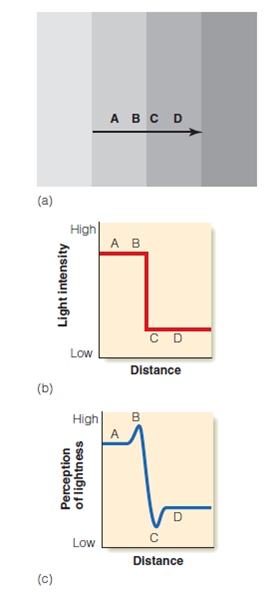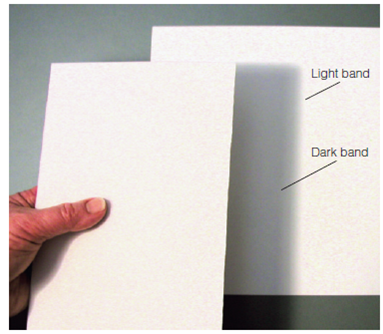
Sensation and Perception 9th Edition by Bruce Goldstein
Edition 9ISBN: 978-1133958475
Sensation and Perception 9th Edition by Bruce Goldstein
Edition 9ISBN: 978-1133958475 Exercise 2
Look for shadows, both inside and outside, and see if you can see Mach bands at the borders of the shadows. Remember that Mach bands are easier to see when the border of a shadow is slightly fuzzy. Mach bands are not actually present in the pattern of light and dark, so you need to be sure that the bands are not really in the light but are created by your nervous system. How can you accomplish this?
Figure 1
Mach bands at a contour between light and dark. (a) Just to the left of the contour, near B, a faint light band can be perceived, and just to the right at C, a faint dark band can be perceived. (b) The physical intensity distribution of the light, as measured with a light meter. (c) A plot showing the perceptual effect described in (a). The bump in the curve at B indicates the light Mach band, and the dip in the curve at C indicates the dark Mach band. The bumps that represent our perception of the bands are not present in the physical intensity distribution.

Figure 2
Shadow-casting technique for observing Mach bands. Illuminate a light-colored surface with your desk lamp and cast a shadow with a piece of paper.

Figure 1
Mach bands at a contour between light and dark. (a) Just to the left of the contour, near B, a faint light band can be perceived, and just to the right at C, a faint dark band can be perceived. (b) The physical intensity distribution of the light, as measured with a light meter. (c) A plot showing the perceptual effect described in (a). The bump in the curve at B indicates the light Mach band, and the dip in the curve at C indicates the dark Mach band. The bumps that represent our perception of the bands are not present in the physical intensity distribution.

Figure 2
Shadow-casting technique for observing Mach bands. Illuminate a light-colored surface with your desk lamp and cast a shadow with a piece of paper.

Explanation
The Mach bands are a kind of optical ill...
Sensation and Perception 9th Edition by Bruce Goldstein
Why don’t you like this exercise?
Other Minimum 8 character and maximum 255 character
Character 255


